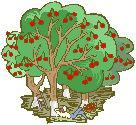Natural Solutions to Things That Bug You (89 page)
Read Natural Solutions to Things That Bug You Online
Authors: Myles Bader

New growth becomes stunted and crinkled,
flowers wither and die……………………………………. Cyclamen mite
Dry brown areas on lower leaf surface in spring,
leaves get brown and die……………………………….. Spider mites
Leaves rolled up and webbed together with silk,
small holes, look for tiny caterpillar…………………….. Leafroller
Ripe fruit has large holes, some leaves eaten…………Cutworms
Deep holes in berries with dried slime around…………Snails & slugs
Holes in fruit with oval bugs in them…………………….Sowbugs
Tiny holes in ripening fruit, no slime around………….. Earwigs
Plant wilting and dying in spring or fall,
whitish caterpillar in crowns…………………………….. Strawberry crown moth
Leaves have scalloped look, smaller roots eaten……. Otiorhynchus root weevil
Honeydew and black sooty mold………………………. Strawberry aphid
Berries have deep furrows or twisted shape,
deformed areas, large hollowed seeds………………… Lygus bug
Plants wilt in warm weather even when
watered, cottony deposit on roots……………………….Ground mealybug

TOMATOES
TO FLOWER OR NOT TO FLOWER
 If you would like early tomatoes, purchase plants with flowers. Don’t be upset if the flowers fall off while you are planting them. They are in their reproductive stage and more flowers will appear shortly. If the plants are young and without flowers they will bear fruit later but will give a better harvest,
If you would like early tomatoes, purchase plants with flowers. Don’t be upset if the flowers fall off while you are planting them. They are in their reproductive stage and more flowers will appear shortly. If the plants are young and without flowers they will bear fruit later but will give a better harvest,
SPEEDY PLANTING
The easiest method of planting tomatoes plants is to use a bulb planter. It will result in a deep hole and will not take a lot of work.
MOOOOOOO
Dry cow manure is the best fertilizer for tomato plants. It will give you a higher yield. Use about 100 pounds per square feet in plants that are spaced about 3 feet apart.
TOMATO PEST PROBLEM SOLVERS
THE PROBLEM CAUSED BY
 Worms in ripe tomatoes…………………………………. Tomato fruitworm
Worms in ripe tomatoes…………………………………. Tomato fruitworm
Worms tunneling in fruit…………………………………. Potato tuberworm
Leaves mined and folded, tiny worms tunneling ………Tomato pinworm
Leaves eaten and only stems remain, fruit small…….. Hornworms
Fruit surface eaten or hollowed out……………………. Snails & slugs
Yellowish cloudy spots on ripe tomatoes,
soft spots………………………………………………….. Stink bugs
Leaves totally eaten off young plants………………….. Vegetable weevil
Lower leaves and stems are bronze color,
plants losing leaves……………………………………….Tomato russet mite
Leaves yellow and slightly curled, insects fly when
disturbed, greenish scales on underneath side of
leaves……………………………………………………… Whiteflies
Leaves curled downward, fruit with shiny spots………. Aphids
Seedlings or transplants with holes in leaves…………. Flea beetle
Poor yield plants, yellow leaves, swelling or
beads on roots……………………………………………. Root knot nematodes
Irregular yellow blotches on leaves…………………….. Powdery mildew
TURNIPS
TURNIP PEST PROBLEMS
THE PROBLEM CAUSED BY
 Distorted plants, curling, wilting, insects
Distorted plants, curling, wilting, insects
on underneath sides of leaves………………………….. Aphids
Holes in leaves, chewing on buds and roots………….. Vegetable weevil
Irregular holes in leaves, seedlings destroyed……….. Caterpillars
Deformed leaves with yellow spotting,
possible wilting…………………………………………… Harlequin bug
Tunneling in roots of seedlings, wilting………………… Cabbage maggot
FIGHTING PLANT DISEASES
HELP! MY BLOSSOMS ARE ROTTING
Blossom-end rotting; is usually caused by too little water or too much water. This problem is common on tomato, peppers and melon plants. If drought is the problem the plants will need at least 1-inch of water per week and keep the plants well mulched. The other cause of blossom-end rot is lack of calcium in the soil. The soil Ph should be about 6-6.5, which can be controlled by using limestone.
MY POTATOES ARE SCABING
To stop potatoes from developing scab, you will need to plant a new breed of potato called the scab-free potato or rotate your crop. If you rotate your crop, do not plant them in a field that has been growing turnips, carrots or beets since these vegetables tend to develop scab as well.

FIRE BLIGHT – CALL THE FIRE DEPARTMENT
Blight in an apple orchard is not uncommon. The best method to combat the problem is to spray with a 50:50 solution of apple cider vinegar and water. Make sure you spray after each rainfall, especially if you see burnt leaves.
BLIGHT PREVENTION
Celery is very susceptible to blight and the best method of avoiding the problem is to soak the seeds in very warm (120
F) water for about 20-25 minutes before you plant the seeds.
GENERAL VEGETABLE SEEDLING PEST PROBLEMS
THE PROBLEM CAUSED BY
Seeds will not germinate or emerge…………………… Birds, seedcorn maggots, wire-worms, garden symphylan, seedrot,
New seedlings emerge dead or fall over……………… Damping-off disease, summer high Heat
Seedling stems chewed off at soil line Cutworms
Both seedling leaves & stem chewed off……………… Earwigs, snails and slugs, sowbugs, pillbugs, caterpillars, darkling
beetles, vegetable weevils, rabbits
Roots of seedlings chewed off………………………….. Wireworms, maggots, gophers
Leaves have small round holes………………………… Flea beetles
Yellow spots on leaves with tiny black spots…………. Thrips
Twisting white lines in leaves………………………….. Leafminers
Pear-shaped insects on leaves………………………… Aphids
Plant has disappeared………………………………….. Gopher or rabbit
Thin, spindly plants……………………………………… Competition from weeds or other
plants too close
CHAPTER 18

PLANTS FOR PEST CONTROL
PLANTS FOR PEST CONTROL

AGAVE
